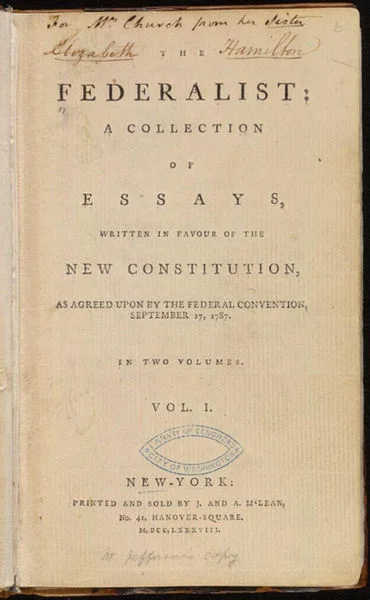Federalist #18 - James Madison - Federalist Fridays
In Federalist #18, James Madison gives us a history lesson on Ancient Greece.
Madison explains certain failures of the Greeks and why (in his opinion) the Constitution is a better government.
Federalist #18
James Madison
December 7, 1787
The Insufficiency of the Present Confederation to Preserve the Union
James Madison returns to write Federalist #18, continuing the discussion of problems with the Articles of Confederation.
This Paper amounts to a history lesson of Ancient Greece. Madison uses Ancient Greece as an example because, “among the confederacies of antiquity, (it was) the most considerable.”
As an interesting side note, this article was published in New York the same day Delaware became the first State to ratify the Constitution.
Superstitions
While this is not the place for a review of the inner workings of Ancient Greece politics, we should review the issues Madison points to.
James mentions that the Greek city-states had a League which had much in common with the United States under the Articles of Confederation. However, further binding them together, the city-states had, “the superstition of the times, one of the principal engines by which government was then maintained.”
In other words, due to their shared religious beliefs, the Ancient Greeks were glued together with the need to protect their great temples.
This was an important aspect of their government that the United States would never have the opportunity to share.
Force
Madison also points out, the city-states had:
“…a declared authority to use coercion against refractory cities, and were bound by oath to exert this authority on the necessary occasions.”
This authorization to force States into compliance was a major benefit for ratifying the Constitution, and had been discussed in the Federalist Papers on several occasions (notably Paper #16).
Anarchy Rather Than Tyranny
Between the shared religion and ability to coerce city-states, the Ancient Greeks seemed to have a head start verse the Articles of Confederation.
This still was not enough, as on several occasions the more powerful city-states would use their pull to control the goings on of the entire League. Madison claims:
“…the deputies of the strongest cities awed and corrupted those of the weaker; and that judgment went in favor of the most powerful party.”
However, divisions between city-states would more often lead to weakening the League, allowing outside nations to come through.
Madison says:
“…(this study) emphatically illustrates the tendency of federal bodies rather to anarchy among the members, than to tyranny in the head.”
In other words, there is a better chance that a union under the Constitution would lead to a separation of the States than a dictator. At the same time, the Constitution is meant to protect against such a disunion.
An Anti-Federalist Argument
In essence, this study of Ancient Greece, demonstrates that the Constitution will simultaneously protect citizens from people who accumulate too much power and a government which is too weak and will fall apart.
An Anti-Federalist might listen to this argument and ask, if that is the case, why the States should united at all. Isn’t the best way to protect from a Confederation that is too strong or weak just to get rid of the confederation in General?
Do you want to read about some Anti-Federalists?
Great!
Try these articles regarding Rawlins Lowndes and Melancton Smith.
Want to read a great book about the Constitution?
Nice!
Personally, I love ‘Plain, Honest Men.’ You’ll love it too so pick up a copy through the Amazon affiliate link below (you’ll support this site, but don’t worry, Amazon pays me while your price stays the same).
Want to get fun American Revolution articles straight to your inbox every morning?
Smart!
Subscribe to my email list here.






